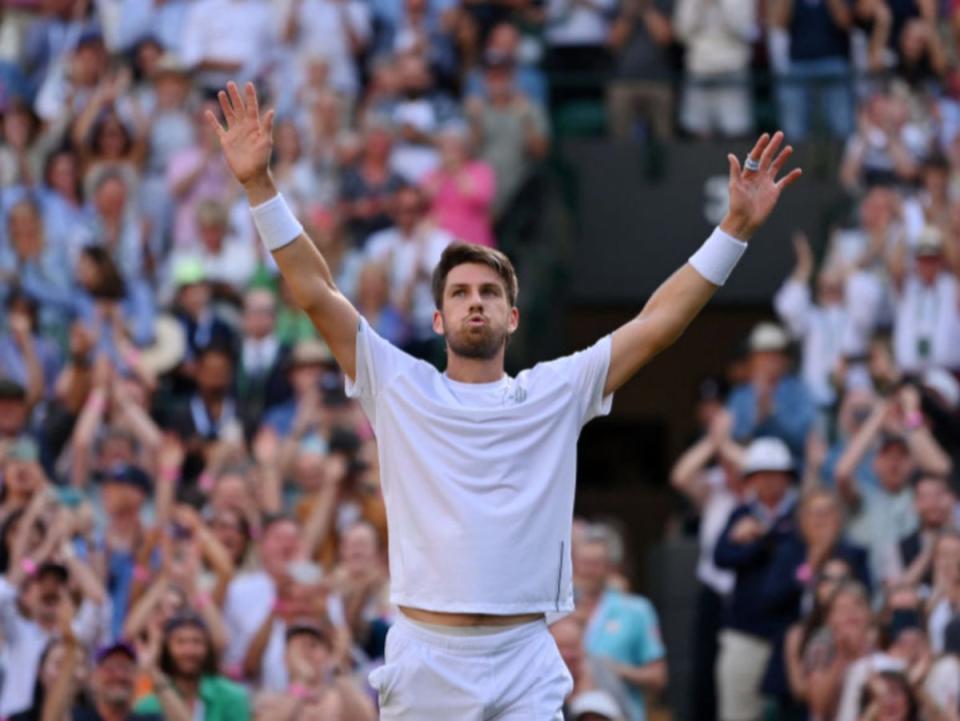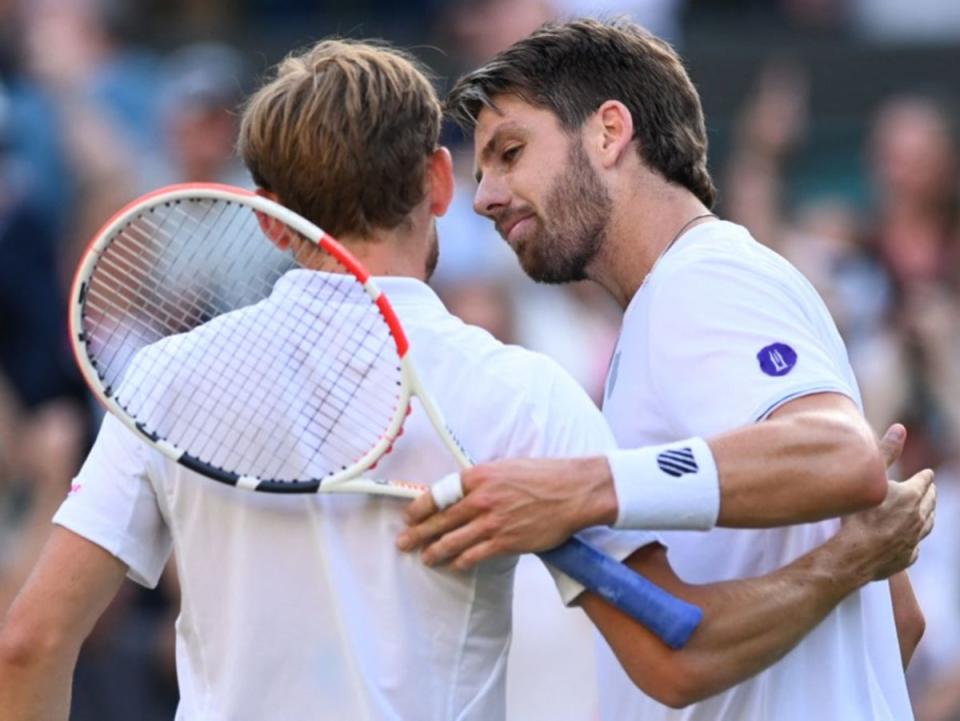Cameron Norrie reaches Wimbledon semi-finals with five-set victory over David Goffin

The unassuming nature that’s masked Cameron Norrie’s rise to British No 1 was ripped off in a thrilling comeback victory that showed heart and desire in striking abundance. This was not quite the odyssey of leaping and thrashing that Andy Murray has always made his signature, but there were tears of joy after Norrie saw off an inspired David Goffin in five tumultuous sets to become Britain’s first Wimbledon semi-finalist since Johanna Konta in 2017.
It was a match Norrie was expected to win against an opponent ranked 46 places below him, but as the relentless consistency that the 26-year-old had shown deserted him in the first and third sets, it appeared as though the occasion might overwhelm him. It would be rude to downplay Goffin’s role in the drama. He reached the quarter-final stage three years ago only to be routed by Novak Djokovic, and the Belgian seemed intent on securing that rematch as he bested Norrie at his own game, winning exhausting rallies and taking risks at the right moments.
This was a victory that beat back the shadow, but there were unavoidably shades of Murray in the way Norrie scrapped his way from the jaws of defeat. As the match crept past three hours, he summoned all his remaining will to break Goffin’s serve at 5-5 in the deciding set. It is the Briton who will now face Djokovic on Friday, and while that may well prove a hurdle too far, this was the sort of performance that will live long in the memory and ensure he creates a legacy of his own.
“I think just winning a match like this, I’m in shock. I don’t know what to say now,” Norrie said. “I have flashbacks of all the hard work and all the sacrifices I have had to make, and it’s definitely paid off – and it feels pretty good.”
The emotions at the end are hard to imagine when set against the angst that seemed to hinder Norrie at the start. Goffin was aggressive and uninhibited from behind the baseline, while Norrie made nine unforced errors – against Steve Johnson, in the fourth round, the Briton had made just 14 in the entire match. It was one such errant forehand that cost Norrie at 3-2, spurning the chance to close out the game before surrendering the break as Goffin’s superiority in the rallies told. The Belgian rapidly held serve to love to consolidate the break, and took the first set 6-3 without ever being greatly troubled.
Norrie was flat and out of sorts, but a tremendous lob from the baseline ignited a similarly subdued crowd. He saved one break point and pumped a fist, but he was weathering a storm rather than stirring one of his own. At 2-2, a double fault was followed by uncharacteristic errors on either side, but he delved deep into his well of spirit and somehow avoided the break. It was always an uphill struggle, though, with Goffin winning long rallies that often lasted more than 20 shots, and history repeated itself in Norrie’s next service game as he found himself 0-40 down. This time there would be no crawling out of the abyss, as a backhand winner sealed the break at the first opportunity.
It felt as though defeat was beckoning, but then that would disregard the scale of what Norrie had already achieved to enter this fortnight as the ninth seed. Goffin wavered at 4-3 and a double fault handed back the break rather meekly. With Goffin serving to stay in the set, Norrie finally stamped his authority on their rallies, driving forehands deep into the court, and the Belgian buckled.
And yet, having battled so hard to level the match, it was as though a knife had ripped through Norrie’s sails. He didn’t just lose speed or momentum, he appeared destined to sink himself, winning just two of the next 18 points as Goffin raced into a 4-0 lead in the third. When Norrie did manage to get one of the breaks back, it was immediately made redundant as he blazed a simple forehand way beyond the baseline and struggled to maintain any rhythm. Goffin closed out the set 6-2, and the fuel for another fightback seemed in short supply.

It was when Norrie took more risks – an approach to which he often seems diametrically opposed – that he had the most success. He forced one break point opportunity at 3-2 in the fourth, but Goffin rose to it well, launching himself into a low-percentage backhand down the line and following it up with a smash to avert the danger. But Norrie maintained the pressure, twice leaning on a wicked forehand drop shot to hold serve, and forged another chance to break at 4-3. A hopeful challenge after a Goffin ace saw the serve ruled out by millimetres, and Norrie rallied the crowd, attempting to feed off their encouragement. As the game stretched into its 10th minute, Goffin’s resistance finally dissolved, a forehand dove into the net, and Norrie broke to take the match into a decider.
The tension became strained as both players felt a maiden grand slam semi-final within touching distance. Norrie saved a break point in his opening service game while Goffin berated himself for missing the chance. It was as costly as he had feared and, as each game became a marathon of nerves, the Belgian lost his edge as the atmosphere and sense of anticipation swelled. At 5-5, Goffin succumbed to the crowd’s will, losing his serve to love in a disastrous game. It still needed Norrie to haul himself over the line but he held his nerve to seal what will go down as the greatest victory of his career so far.

 Yahoo Sport
Yahoo Sport 





































